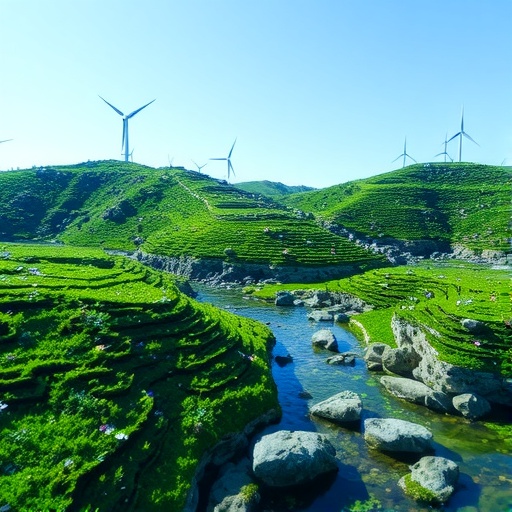In a surprising turn of events, a retraction note has emerged concerning the study titled “EU28 region’s water security and the effect of bioenergy industry sustainability.” Authored by M. Alsaleh, A.S. Abdul-Rahim, and M.M. Abdulwakil, this research was initially aimed at addressing the pressing issues regarding water security in the European Union’s 28 member states, particularly in light of the burgeoning bioenergy industry. The retraction raises important questions about the integrity of scientific research and the implications for environmental policy and sustainability.
Water security has emerged as one of the most critical challenges facing the European Union, particularly as climate change continues to exacerbate water scarcity. The initial research sought to provide insights into how the bioenergy sector, while considered a renewable energy source, can impact water resources. The authors intended to analyze the relationship between bioenergy production and water security, arguing that the sustainability of bioenergy practices is paramount to maintaining safe and reliable water supplies.
Throughout the study, the authors presented various models and data analyses to support their claims. They highlighted the dual challenge of managing water resources effectively while promoting renewable energy. The research underscored the importance of sustainable agricultural practices in bioenergy production, suggesting that improper management could lead to significant negative effects on water quality and availability. However, the newly issued retraction note has put these conclusions under scrutiny.
While some parts of the research were praised for their rigorous methodology and data collection techniques, others raised concerns about the validity and reliability of the findings. Peer reviewers and fellow researchers began questioning the robustness of the conclusions drawn from the data, pointing out gaps in the analysis that could have skewed the results. The scientific community relies heavily on transparency and reproducibility, and when one or more of these factors are compromised, the integrity of the research is called into question.
The retraction note itself details the reasons behind this concerning decision. It notes specific issues related to data interpretation and methodological flaws that may have led to misleading conclusions about the relationship between bioenergy sustainability and water security. Such admissions remind us of the complex interdependencies between energy production and water resources, and they underline the necessity for ongoing scrutiny and critical assessment in scientific research.
Scientists and policymakers must be attentive to the retraction’s implications. As countries strive to meet their climate goals through renewable energy solutions, it is essential that they base these strategies on sound scientific evidence. This incident highlights the importance of peer review and the continuous vetting of scientific literature to ensure accurate and impactful conclusions are shared with the public and utilized in policy-making.
Moreover, the retraction serves as a timely reminder of the intrinsic challenges that accompany interdisciplinary research. As fields like environmental science, energy policy, and hydrology increasingly intersect, studies must carefully navigate the complexities inherent in these relationships. It becomes critical for researchers to adopt comprehensive methodologies and engage with experts across various disciplines to enhance the robustness of their findings.
The repercussions of this retraction extend beyond academia. Policymakers who rely on such studies to inform regulations around the bioenergy sector may need to reevaluate their strategies. Water security is a fundamental aspect of public health and environmental sustainability, making it even more vital that the principles governing bioenergy production are grounded in reliable science.
In the wake of this announcement, researchers and institutions involved in similar studies will likely face increased scrutiny. Funding bodies and academic journals may impose stricter guidelines to ensure the quality of the research they sponsor and publish. This could lead to a reexamination of peer review processes and a commitment to higher standards in research publication.
As the discourse surrounding water security and bioenergy sustainability continues, scholars will need to navigate these challenges thoughtfully. The community must remain vigilant in upholding the values of scientific inquiry and foster an environment where researchers can admit mistakes and hold themselves accountable, ensuring that corrective actions lead to growth and improvement in the field.
Therefore, the scientific community must also consider the broader ramifications of research retractions. An increase in skeptical public sentiment towards scientific endeavors and the potential for misinformation spreading can undermine progress in addressing urgent environmental challenges. Researchers, therefore, have a responsibility to communicate their findings transparently, acknowledge limitations, and engage the public effectively.
In conclusion, the retraction of the study regarding the EU28 region’s water security and bioenergy industry sustainability highlights the need for rigorous scientific practices and the critical examination of interdisciplinary research. As we grapple with the dual challenges of water scarcity and the demand for renewable energy, the lessons drawn from this incident will shape future research endeavors aimed at ensuring our water resources remain secure while promoting sustainable energy solutions.
Subject of Research: Water security in the EU28 region and the bioenergy industry’s impact on sustainability.
Article Title: Retraction Note: EU28 region’s water security and the effect of bioenergy industry sustainability.
Article References:
Alsaleh, M., Abdul-Rahim, A.S. & Abdulwakil, M.M. Retraction Note: EU28 region’s water security and the effect of bioenergy industry sustainability.
Environ Sci Pollut Res (2025). https://doi.org/10.1007/s11356-025-37208-3
Image Credits: AI Generated
DOI:
Keywords: water security, bioenergy, sustainability, EU28, environmental policy, scientific integrity, research retraction, renewable energy, interdisciplinary research, public health.




